
Torn rotator cuffs are a frequently encountered problem identified in my office on a daily basis. Sadly, far too many patients are under the assumption that because something is torn, it must, therefore, be fixed. Luckily, many of you with torn rotator cuffs will not require surgery. Let’s dive a little deeper in the shoulder and the subject of rotator cuff tears.
The rotator cuff is four small muscles which control our shoulder stability and motion. These are small muscles which are easily overcome by repetitive stress, age-related degeneration or a traumatic injury. In order to guide you further, let’s answer the following questions.
Torn Rotator Cuffs Questions
- Why are torn rotator cuffs so common?
- What caused my torn rotator cuff?
- Do all torn rotator cuffs require surgery?
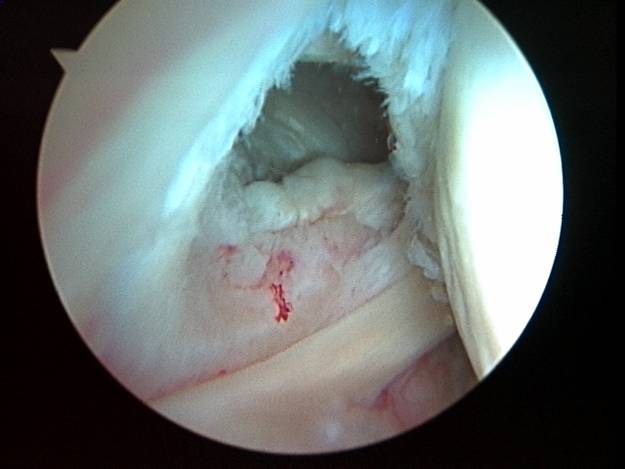
The rotator cuff is composed of tendon tissue. A tendon is a structure which connects a muscle to the bone. In the pictures to the right, the rotator cuff is the white tissue you see attaching to the ball which is the top of the arm bone.
Most of our tendons are very thick and very strong. They also have a very firm grasp of the bone they are attached to. Our bodies are very “smart”. The more we use a tendon, the stronger and thicker it gets. Similarly, the less we use it, the weaker it becomes.
Most torn rotator cuffs are not caused by an injury such as a fall. Some torn rotator cuffs are caused by trauma, and I’ll discuss that later. The vast majority of rotator cuff tears involve the tendon of the supraspinatus muscle. Because of how the shoulder works, the supraspinatus is subject to very little stress… therefore the tendon can become thin; its attachment becomes weak, and eventually, a hole develops. Many torn rotator cuffs have a degenerative origin, much like the front of your knee on your favorite pair of blue jeans. This hole is unfortunately called a tear — and many of you believe you have actually torn your rotator cuff. We refer to these common tears as “degenerative rotator cuff tears”. That implies that the tendon simply wore out.
Does all Torn Rotator Cuffs Need Surgery?
There is a lot of recent literature or scientific evidence that many torn rotator cuffs do not become larger and the majority of torn rotator cuffs will not require surgery. Contrary to the studies I just mentioned, there is literature showing that the number of torn cuffs being treated surgically has also risen dramatically. The authors speculate that our fee-for-service reimbursement system is to blame.
The majority of people with a degenerative and torn rotator cuffs can be managed quite effectively with physical therapy, injections, rest from certain overhead activities for a while and patient observation. We do recommend an annual visit to your doctor so they can assess your level of function, pain and perhaps image your rotator cuff with an Ultrasound or MRI to look to see if the tear has become larger. In patients who fail to improve with non-surgical measures, or in patients whose tear becomes much larger, then rotator cuff surgery is indicated.
I mentioned before that most torn rotator cuffs occur due to the fact that our tissues simply wears out. Another (far less common) source of a tear in your rotator cuff is trauma or an injury. Torn rotator cuffs generally require a significant injury to cause a tear. Most shoulder docs would agree. In patients with acute (recent), traumatic tears, surgery is generally indicated to repair the tear and sew it back to the bone it was torn from. PRP or Stem cells for the treatment of torn rotator cuffs is controversial at present… and is the subject of significant investigation.
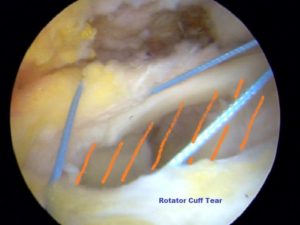
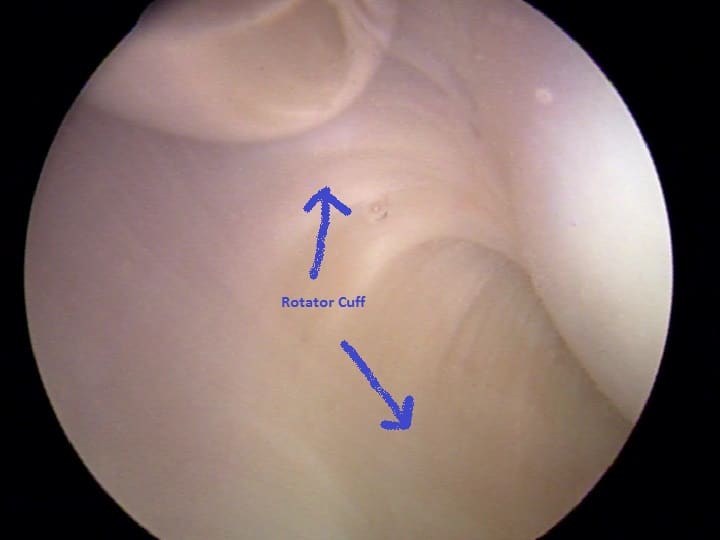
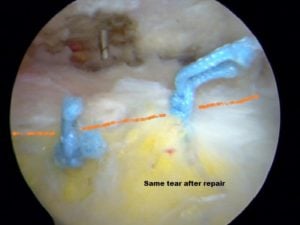


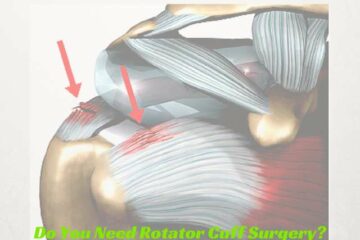


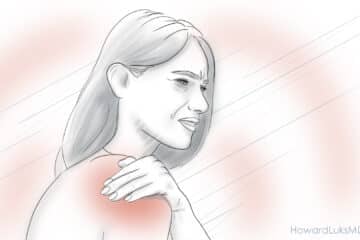








I was lifting a 50 lb bag of cement into the back of a pickup truck. the tailgate would not come down. In lifting it over the tailgate a loud pop like a bone breaking. I cant raise my left arm but my wife raise it up and i had no pain. I am in sever amount of pain. I go to a pain Dr. and the med im on will help for a short amount of time. I am thinking about going to the ER.
I would see an orthopedist
I’m 20 in good physical shape and my shoulder pops out every time I move my right arm back behind me or throw a ball in a pitchers form. My injury happened throwing the old pig skin out back with my brother. I went to throw the ball for a long pass and it felt like I threw my arm out. Now it really hurt and I felt my shoulder pop out of place. I was able to pop it back in and it was sore for about 2 days. A couple of weeks after that I was getting on to a trailer and as I was pulling my self in to the trailer I had my arm a little bit behind me as I was getting on and it my shoulder popped out again. It hurt again and I was in pain like before. I went through the same procedure. It happens alot when I use my right arm for physical activity. One time it happened when I was putting on a sweater. It been going like this for over 3 years. After like 2 days my arm is better everytime it pops out. I am wondering if this is normal or can it lead to something worse. I do have a lot of muscle and lift weights regularly. So I’m in really good physical shape.
definitely not normal … time to see a good Orthopedic Sports Doc with an interest in shoulder injuries
Finding this article has been a godsend, thank you. I hurt my shoulder over a month ago when I was horsing around with my husband. We are very physical people and play a lot of rugby. In this case he tackled me and I turned and took it all in the shoulder. I heard a crunch and it felt weak. In the weeks since I have lost range of motion in the right, can not sleep on my right arm, get a sharp pain if I lift the arm behind my head, and get a very loud pop at other times. I am still doing yoga with some discomfort in some poses but I can lower into cobra and hold downward dog. I’m 46, mid sized, fit. But I’m worried I might need surgery. By the sounds of your article, maybe not? I’m going for an ultrasound but not for three weeks. Should I try to get in earlier? Thank you Dr!
Many potential causes of your pain and decreased motion… A good exam is where I would start. Followed by an US or MRI if needed.
2-3 weeks should be ok.
Good Luck !!!
I hit a basketball like a volleyball last week in gym (whoops) and my shoulder popped and instantly went numb. It has hurt since and I can’t raise it above my head without wincing. Should I be concerned?
You should be evaluated … that could mean that your shoulder dislocated, then reduced or went back in spontaneously.